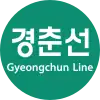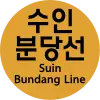Cheongnyangni station
Cheongnyangni Station (청량리역) is a major railway station located at Dongdaemun-gu, Seoul, South Korea. It serves as a terminus for passenger trains serving the eastern part of South Korea. KTX, ITX-Cheongchun, and Mugunghwa-ho trains terminates or stops at this station. Several Seoul Metropolitan Subway lines serve the station. These are: Seoul Subway Line 1, the Gyeongchun Line, the Suin–Bundang Line and the Gyeongui–Jungang Line.
| |||||||||||||||||||||||||||||||||||||||||||||||||
|---|---|---|---|---|---|---|---|---|---|---|---|---|---|---|---|---|---|---|---|---|---|---|---|---|---|---|---|---|---|---|---|---|---|---|---|---|---|---|---|---|---|---|---|---|---|---|---|---|---|
 Korail station building | |||||||||||||||||||||||||||||||||||||||||||||||||
| Korean name | |||||||||||||||||||||||||||||||||||||||||||||||||
| Hangul | |||||||||||||||||||||||||||||||||||||||||||||||||
| Hanja | |||||||||||||||||||||||||||||||||||||||||||||||||
| Revised Romanization | Cheongnyangni-yeok | ||||||||||||||||||||||||||||||||||||||||||||||||
| McCune–Reischauer | Ch'ŏngnyangni-yŏk | ||||||||||||||||||||||||||||||||||||||||||||||||
| General information | |||||||||||||||||||||||||||||||||||||||||||||||||
| Location | 620-69 Jeonnong-dong, 205 Wangsanno Jiha, Dongdaemun-gu, Seoul | ||||||||||||||||||||||||||||||||||||||||||||||||
| Coordinates | 37°34′48″N 127°02′42″E | ||||||||||||||||||||||||||||||||||||||||||||||||
| Operated by | Seoul Metro Korail | ||||||||||||||||||||||||||||||||||||||||||||||||
| Line(s) | |||||||||||||||||||||||||||||||||||||||||||||||||
| Platforms | 8 | ||||||||||||||||||||||||||||||||||||||||||||||||
| Tracks | 8 | ||||||||||||||||||||||||||||||||||||||||||||||||
| History | |||||||||||||||||||||||||||||||||||||||||||||||||
| Opened | October 15, 1911[2] | ||||||||||||||||||||||||||||||||||||||||||||||||
| Key dates | |||||||||||||||||||||||||||||||||||||||||||||||||
| August 15, 1974 | Line 1 opened[3] | ||||||||||||||||||||||||||||||||||||||||||||||||
| September 26, 2016 | Gyeongchun Line opened | ||||||||||||||||||||||||||||||||||||||||||||||||
| December 31, 2018 | Suin–Bundang Line opened | ||||||||||||||||||||||||||||||||||||||||||||||||
| Passengers | |||||||||||||||||||||||||||||||||||||||||||||||||
| (Daily) Based on Jan-Dec of 2012. KR: 11,782[4] Line 1: 66,305[5] Jungang Line: 26,488[5] | |||||||||||||||||||||||||||||||||||||||||||||||||
| |||||||||||||||||||||||||||||||||||||||||||||||||
The Gyeongchun Line extended from Sangbong Station to Cheongnyangni Station in September 2016, offering a transfer to Line 1, although only some services terminate here, with others terminating at Sangbong.[6] A physical transfer between underground and aboveground stations opened on 20 August 2010.[7]
Passenger trains serving the following Korail lines terminate at Cheongnyangni Station:
- The Yeongdong Line and Taebaek Line to Gangneung, in Gangwon Province;
- The Jungang Line to Andong in North Gyeongsang Province and Busan, to the southeast of Seoul.
In addition, this station is served by all ITX trains to/from Chuncheon Station on the Gyeongchun Line. However, the majority of trains do not terminate at this station but continue to Yongsan Station.
Vicinity
Line 1
- Exit 1: Cheongnyangni Grocery Market
- Exit 2:
- Exit 3: Miju APT
- Exit 4: Cheongnyangni Train Station
- Exit 5: Lotte Department Store Cheongnyangni
- Exit 6: St. Paul Hospital
Aboveground Station
- Exit 1: Cheongnyangni Subway Station, Lotte Department Store Cheongnyangni
See also
- Cheongnyangni 588, a red-light district
References
- 청량리역 (in Korean). KRIC. Retrieved 2015-09-24.
- "수도권 도시철도 2천km시대 열린다" (in Korean). Business Post. 2015-04-16. Retrieved 2015-09-24.
- Monthly Number of Passengers between General Railroad Stations Archived 2014-10-08 at the Wayback Machine. Korea Transportation Database, 2013. Retrieved 2013-10-15.
- Monthly Number of Passengers between Subway Stations Archived October 6, 2014, at the Wayback Machine. Korea Transportation Database, 2013. Retrieved 2013-10-15.
- "동대문구, 제3차 국가철도망 구축...청량리역 포함 - 국제뉴스". 6 February 2016.
- "기차역검색 – 청량리역". 한국철도공사. Archived from the original on 11 April 2013. Retrieved 15 February 2013.
External links
- (in Korean) Station information from Korail



